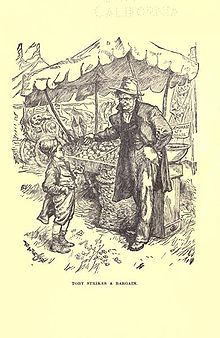
Toby Tyler; or, Ten Weeks with a Circus is a children's novel by "James Otis", the pen name of James Otis Kaler.
Summary
Toby Tyler tells the story of a ten-year-old orphan who runs away from a foster home to join the traveling circus only to discover his new employer is a cruel taskmaster. The difference between the romance of the circus from the outside and the reality as seen from the inside is depicted. Toby's friend, Mr. Stubbs the chimpanzee, reinforces the consequences of what happens when one follows one's natural instincts rather than one's intellect and conscience, a central theme of the novel.
Publication history
Toby Tyler was initially serialized in Harper's Young People in 1877, then published as a book in 1881. It became something of a classic among American boys and girls who dreamed of running away to join the circus and remained popular for generations. It was James Otis Kaler's first book and also his best known and most successful.
The original book contains 30 pen and ink drawings by W. A. Rogers (1854-1931). A sequel, Mr. Stubb's Brother, was published in 1883. In 1923 it was made into a silent film by Eddie Cline entitled Circus Days as a vehicle for child star Jackie Coogan. Disney also honored it with a film version, Toby Tyler, starring Kevin Corcoran in 1960.
Analysis

Toby Tyler is a "bad boy" novel, meant to teach a lesson about what happens to boys who do bad things; other examples include George W. Peck's Peck's Bad Boy (1883), Thomas Bailey Aldrich's The Story of a Bad Boy (1870), and Mark Twain's Adventures of Tom Sawyer (1876). As with Mark Twain's Adventures of Huckleberry Finn (1884), also about a conscience-stricken escaped and wandering orphan boy (written following the success of Toby Tyler), most readers don't remember Toby Tyler for its wholesome message, but as a romantic story of running away to the circus and adventures on the road.
The book was influential with some famous "bad boys". A young Carl Sandburg thought Toby Tyler was one of his favorite books (even better than Adventures of Huckleberry Finn). Harlan Ellison credits it as influencing his decision to run off with the circus. William S. Burroughs wrote of it in his journals.
References
- Chisholm, Hugh, ed. (1913). The Britannica Yearbook. Encyclopœdia Britannica Company. p. 758.
In 1877 he wrote Toby Tyler as a serial in Harper's Young People and then devoted himself to books for children, notably the "Minute-Boy Series", writing nearly 150 volumes, including serials..
- "Notes and Announcements: Necrology". Cumulative Book Index. XV (6). H. W. Wilson Company: 13. January 1913.
- ^ Griswold, Jerry (2003). "Children's Literature". In Serafin, Steven R. (ed.). The Continuum Encyclopedia of American Literature. New York: Continuum. p. 183.
- Griswold, Jerry (1996). "Children's Literature in the USA: A Historical Overview". In Hunt, Peter (ed.). International Companion Encyclopedia of Children's Literature. p. 877.
- Allen, Gay Wilson (1972). Carl Sandburg. University of Minnesota Press. p. 9.
- Weil, Ellen (2002). Harlan Ellison: The Edge of Forever. Columbus: Ohio State University Press. p. 28.
- Burroughs, William S. (2000). Grauerholz, James (ed.). Last Words: The Final Journals of William S. Burroughs. Grove Press. p. 206.
External links
- Toby Tyler available at Internet Archive (scanned books original editions illustrated color)
- Otis, James. Toby Tyler; Or, Ten Weeks with a Circus at Project Gutenberg
 Toby Tyler; or, Ten Weeks with a Circus public domain audiobook at LibriVox
Toby Tyler; or, Ten Weeks with a Circus public domain audiobook at LibriVox